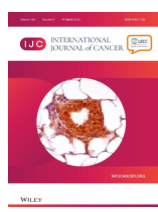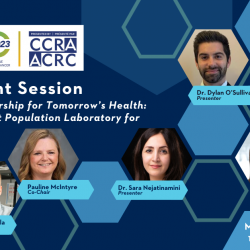Authors: Maartje Basten, Kuan-Yu Pan, Lonneke A. vanTuijl, Alexander deGraeff, Joost Dekker, Adriaan W.Hoogendoorn, Femke Lamers, Adelita V. Ranchor, Roel Vermeulen, Lützen Portengen, Adri C. Voogd, Jessica Abell, Philip Awadalla, Aartjan T.F. Beekman, Ottar Bjerkeset, Andy Boyd, Yunsong Cui, Philipp Frank, Henrike Galenkamp, Bert Garssen, Sean Hellingman, Martijn Huisman, Anke Huss, Melanie R. Keats, Almar A.L. Kok, Steinar Krokstad, Flora E. vanLeeuwen, Annemarie I. Luik, NolwennNoisel, Yves Payette, Brenda W.J.H. Penninx, Ina Rissanen, Annelieke M. Roest, Judith G.M. Rosmalen, Rikje Ruiter, Robert A. Schoevers, David Soave, Mandy Spaan, Andrew Steptoe, Karien Stronks, Erik R. Sund, Ellen Sweeney, Emma L. Twait, Alison Teyhan, W.M. Monique Verschuren, Kimberly D. vanderWillik, Mirjam I. Geerlings Journal: International Journal of Cancer Abstract: Depression, anxiety and other psychosocial factors are hypothesized to be involved in cancer development. We examined whether psychosocial factors interact with or modify the effects o fhealth behaviors, such as smoking and alcohol use, in relation to cancer incidence. Two-stage individual participant data meta-analyses were performed based on 22cohorts of the PSYchosocial factors and CAncer (PSY-CA) study. We examined nine psychosocial factors (depression diagnosis, depression symptoms, anxiety diagnosis, anxiety symptoms, perceived social support, loss events, general distress, neuroticism, relationship status), seven health behaviors/behavior-related factors (smoking, alcohol use, physical activity, body mass index, sedentary behavior, sleep quality, sleep duration)and seven cancer outcomes (overall cancer, smoking-related, alcohol-related, breast, lung, prostate, colorectal). Effects of the psychosocial factor, health behavior and their product term on cancer incidence were estimated using Cox regression. We pooled cohort-specific estimates using multivariate random-effects meta-analyses. Additive and multiplicative interaction/effect modification was examined. This study involved 437,827 participants, 36,961 incident cancer diagnoses, and 4,749,481 person years of follow-up. Out of 744 combinations of psychosocial factors, health behaviors, and cancer outcomes, we found no evidence of interaction. Effect modification was found for some combinations, but there were no clear patterns for any particular factors or outcomes involved. In this first large study to systematically examine potential interaction and effect modification, we found no evidence for psychosocial factors to interact with or modify health behaviors in relation to cancer incidence. The behavioral risk profile for cancer incidence is similar in people with and without psychosocial stress. doi: 10.1002/ijc.34852








